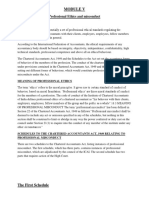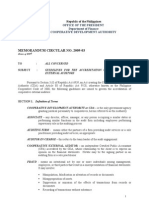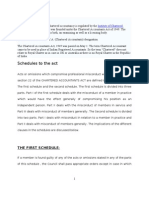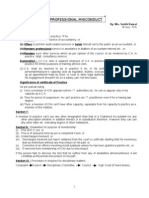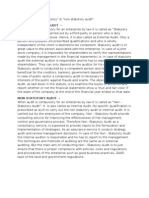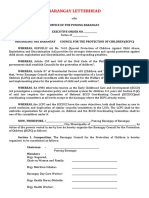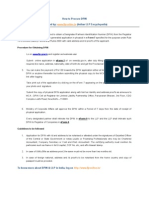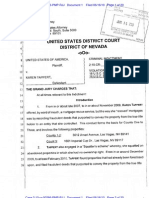Chapter - 5 "Professional Ethics": Lecture - 5
Chapter - 5 "Professional Ethics": Lecture - 5
Uploaded by
Harshit JainCopyright:
Available Formats
Chapter - 5 "Professional Ethics": Lecture - 5
Chapter - 5 "Professional Ethics": Lecture - 5
Uploaded by
Harshit JainOriginal Title
Copyright
Available Formats
Share this document
Did you find this document useful?
Is this content inappropriate?
Copyright:
Available Formats
Chapter - 5 "Professional Ethics": Lecture - 5
Chapter - 5 "Professional Ethics": Lecture - 5
Uploaded by
Harshit JainCopyright:
Available Formats
Lecture - 5
Chapter – 5 “Professional Ethics”
(5) First Schedule: PART – II (Professional Misconduct for Members in Service)
A member in service, shall be deemed to be guilty of professional misconduct, if he
Clause – 1: pay or allow or agree to pay
directly or indirectly, to any person
any share in emoluments of employment undertaken by him.
For Example: Mr. X agree to pay 50% of his salary of first month to ABC
ABC consultants as consideration for arranging employment for
him.
Clause – 2: accept or agree to accept
any part of fees, profits or gains from
a Lawyer, CA or broker engaged by the company, firm or other person
(i.e. Employer)
Or
agent or customer of such company firm or other person
by way of commission or Gratification.
For Example: Mr. A (Finance Manager) of ABC Ltd. ask for 50% share in fees
of Advocate, as a consideration to refer legal cases of ABC
Ltd. to him.
Compiled by: CA. Pankaj Garg www.altclasses.in 5.1
Professional Ethics Chapter 5
(6) First Schedule – Part III – Professional Misconduct – Members Generally:
A member of ICAI, whether in practice or not, shall be deemed to be guilty of professional
misconduct, if he
Clause – 1: not being a fellow member, but acting as a fellow member.
Clause – 2: does not supply the information called for
or
does not comply with the requirements asked for
by ICAI, its Council, Committees, Director Discipline, Board of Discipline,
Disciplinary Committee, Appellate Authority or Quality Review Board.
Note: Providing false information to ICAI, its Council, Committees, Director
Discipline, Board of Discipline, its Committee, Disciplinary Committee,
Appellate Authority or Quality Review Board will amount to Professional
Misconduct under Clause 3, Part II of Second Schedule.
Clause – 3: While inviting professional work from another CA
or
responding to tenders
or
advertises the professional work
as per permitted means under clause 6 and 7 of
Part I of First Schedule
provides the information, knowing to be false.
Compiled by: CA. Pankaj Garg www.altclasses.in 5.2
Chapter 5 Professional Ethics
(7) Other Misconduct – Part IV of First Schedule
- Part III of Second Schedule for Members Generally
A member of the Institute, whether in practice or not, shall be deemed to be guilty of
Other Misconduct, if he
Clause – I, Part IV, First Schedule Clause I, Part III, 2nd Schedule
is held guilty of any offence by any Civil is held guilty of any offence by any Civil
or Criminal Court, which is punishable or Criminal Court, which is punishable
with imprisonment for a term with imprisonment for a term exceeding
upto 6 Months 6 Months
Clause – 2, Part IV, First Schedule:
A member of the Institute, whether in practice or not, shall be deemed to be guilty of
Other Misconduct, if he
brings any disrepute to the profession or the Institute
as a result of his conduct, whether or not related with the professional work.
Examples:
(a) Dishonor of cheques due to insufficient funds.
(b) Using Coercive methods to obtain a loan.
(c) Non-repayment of loan.
(d) Retaining client’s records without sufficient cause.
(e) Misappropriation of funds, etc.
DO PRACTICE – Questions on Part II, III and IV
Compiled by: CA. Pankaj Garg www.altclasses.in 5.3
Professional Ethics Chapter 5
(8) Second Schedule – Part I – Professional Misconduct – Members in PRACTICE
Clause – I: Disclosure of Client’s information:
A CA in practice shall be deemed to be guilty of professional misconduct, if he
discloses the client’s information acquired during the course of professional
work to others
Except when – (a) permitted by client
or
(b) required by law.
Auditor’s duties as to disclosure of frauds committed by clients:
(i) SA-240 requires the auditor to communicate the information relating to fraud to
Regulatory and Enforcement Authorities, when required by law.
(ii) Sec. 143(12) of Companies Act, 2013 requires the auditor to report the fraud in
certain cases to Central Government in the manner prescribed under Rule 13 of
Companies (Audit and Auditor’s) Rules, 2014.
(iii) Para 3(xi) of CARO, 2020 requires the auditor to report the fraud committed by the
company or over the company by any officer or Employee of the company.
In addition, auditor is also required to report whether he has considered Whistle -
blower complaints, if any received during the year by the company.
Compiled by: CA. Pankaj Garg www.altclasses.in 5.4
Chapter 5 Professional Ethics
Member’s duties in relation to taxation fraud:
Taxation fraud
Belongs to past period Current Period
Client represented by client not represented
by the Member by the Member
Advise client to Advise client to Advise client to
Disclose disclose disclose
If not disclosed if not disclosed if not disclosed
Withdraw from current Determine its impact Modify the opinion
Period Assignment on current year and
AND disassociate with Income
Inform Income Tax Tax Return.
Authorities not to rely
over the report for No Impact Impact on Current year
Past Period
No Further duty Modify the opinion
Note: Details about and
Fraud need not disassociate with
be disclosed Income Tax Return
DO PRACTICE – Questions on clause 1
Compiled by: CA. Pankaj Garg www.altclasses.in 5.5
Professional Ethics Chapter 5
Clause 2: Certification without Examination:
A CA in practice shall be deemed to be guilty of professional misconduct, if he
certifies or submits in his name or firm’s name
a report on examination of financial statements
unless examination of such statement and related records has been made by
him, his partner, employee or another CA in practice.
Clause 3: Permitting use of name in Connection with Estimate of Earnings:
A CA in practice shall be deemed to be guilty of professional misconduct, if he
permits his name or firm’s name
to be used in connection with an estimate of earnings, which is contingent upon
future transactions
in a manner which leads to belief that he vouches for the accuracy of
the forecast.
Note: In this reference, practicing CA must ensure compliance of requirements of SAE-3400
“The Examination of Prospective Financial Information (PFI)”.
As per SAE – 3400,
(i) Preparation of PFI is responsibility of management.
(ii) While preparing PFI, following disclosure must be there:
(a) Source of information, (b) Basis of forecast, & (c) Assumptions used.
(iii) A Practicing CA, if engaged by management for prepn of PFI, he should ensure
appropriate disclosures and in the “Accountant Report”, it should be stated
that no vouching done for the accuracy of the forecast.
DO PRACTICE – Questions on Clause 3
Compiled by: CA. Pankaj Garg www.altclasses.in 5.6
Chapter 5 Professional Ethics
Clause – 4: Expressing opinion on financial statements of an entity in which member has
substantial interest:
A CA in practice shall be deemed to be guilty of professional misconduct, if he
expresses an opinion on the financial statements of an entity in which
he, his partner or firm is having substantial interest.
Other Explanations as per Code of Ethics: details to be covered from books.
DO PRACTICE – Questions on Clause 4
Compiled by: CA. Pankaj Garg www.altclasses.in 5.7
You might also like
- Wildfang v. TargetDocument56 pagesWildfang v. TargetCaitlin CanahaiNo ratings yet
- PE - SCH 1Document1 pagePE - SCH 1ero0244393No ratings yet
- Chapter 22 Professional Ethics PMDocument51 pagesChapter 22 Professional Ethics PMDevi PrasadNo ratings yet
- 82679cajournal Nov2024 31Document2 pages82679cajournal Nov2024 31Puneet MittalNo ratings yet
- Professional Ethics-First ScheduleDocument1 pageProfessional Ethics-First Schedule1221snehNo ratings yet
- UntitledDocument365 pagesUntitledCharu JagetiaNo ratings yet
- Ca Final (Advanced Auditing & Professional Ethics) Answer Sheet of Mock Test - IDocument13 pagesCa Final (Advanced Auditing & Professional Ethics) Answer Sheet of Mock Test - ISrinivas RevankarNo ratings yet
- CT AuditReg 1 SA PDFDocument5 pagesCT AuditReg 1 SA PDFKhushi KapurNo ratings yet
- 75358cajournal August2023 9Document3 pages75358cajournal August2023 9S M SHEKARNo ratings yet
- Professional EthicsDocument23 pagesProfessional EthicsNavya Sruthi SNo ratings yet
- Professional Mis Conduct in AuditingDocument6 pagesProfessional Mis Conduct in Auditingsameerkhan855No ratings yet
- PE - SCH 2Document1 pagePE - SCH 2ero0244393No ratings yet
- 10 - Liabilities of The AuditorDocument8 pages10 - Liabilities of The AuditorRavi RothiNo ratings yet
- CA Final Audit Ke Sawaal Professional Ethics Free Sample NotesDocument53 pagesCA Final Audit Ke Sawaal Professional Ethics Free Sample NotesSarabjeet SinghNo ratings yet
- AuditingDocument33 pagesAuditingZulaikha panhwarNo ratings yet
- Final Audit - Reg - May 24 - MS - 1Document4 pagesFinal Audit - Reg - May 24 - MS - 1denigo3568No ratings yet
- CDA AccreditationDocument11 pagesCDA AccreditationAndres Lorenzo III50% (2)
- Pe Only SCH PDFDocument8 pagesPe Only SCH PDFicai.auditp1No ratings yet
- Geeta Saar 107 Auditor Not To Render Certain ServicesDocument7 pagesGeeta Saar 107 Auditor Not To Render Certain Servicesvaibhavayush994No ratings yet
- Ethics May 2016 Revised03 - After SCH 1 Part 1 Till CGGDocument64 pagesEthics May 2016 Revised03 - After SCH 1 Part 1 Till CGGHardik PatelNo ratings yet
- Schedules To Ca Act1949Document5 pagesSchedules To Ca Act1949Dheeraj VermaNo ratings yet
- This Study Resource Was: Common Test - Suggested Answers Aud 689 - Audit and Assurance ServicesDocument4 pagesThis Study Resource Was: Common Test - Suggested Answers Aud 689 - Audit and Assurance ServicesApril CaringalNo ratings yet
- Cajournal March2023 10Document3 pagesCajournal March2023 10S M SHEKARNo ratings yet
- Professional Ethics IMPORTANTDocument4 pagesProfessional Ethics IMPORTANTyash.chocolateboyNo ratings yet
- ETHICS MAY 2016 Revised02 - SCH1 PART 1Document90 pagesETHICS MAY 2016 Revised02 - SCH1 PART 1Hardik PatelNo ratings yet
- Audit Chapter 20 PDFDocument45 pagesAudit Chapter 20 PDFÑïkêţ BäûðhåNo ratings yet
- Role of The Insolvency and Bankruptcy Board of India (IBBI)Document12 pagesRole of The Insolvency and Bankruptcy Board of India (IBBI)SNEHA SOLANKINo ratings yet
- At Reviewer PT 3Document22 pagesAt Reviewer PT 3lender kent alicanteNo ratings yet
- SchedulefileDocument3 pagesSchedulefilePrachi AsawaNo ratings yet
- Answer To Problems and Case (Chapter 3) - Falak Jan EnayatDocument5 pagesAnswer To Problems and Case (Chapter 3) - Falak Jan EnayatFalak EnayatNo ratings yet
- Liabilities of AuditorDocument39 pagesLiabilities of AuditorMenuka SiwaNo ratings yet
- Paper 3 - Audit - TP-2Document6 pagesPaper 3 - Audit - TP-2Suprava MishraNo ratings yet
- AUD689 2019 June SolutionDocument9 pagesAUD689 2019 June SolutionRossa HohoNo ratings yet
- Schedules To The Act: Institute of Chartered Accountants of India IcaiDocument16 pagesSchedules To The Act: Institute of Chartered Accountants of India IcaiPurva SadameNo ratings yet
- Indpendence Requirements - 4A 4B of COE 2018Document8 pagesIndpendence Requirements - 4A 4B of COE 2018maya adhikariNo ratings yet
- Regulatory ActionsDocument20 pagesRegulatory ActionsNancy AgrawalNo ratings yet
- Coe Unlawful Acts or DefaultsDocument5 pagesCoe Unlawful Acts or DefaultsdesmondlliimNo ratings yet
- CA Inter Auditing RTP Nov22Document30 pagesCA Inter Auditing RTP Nov22tholkappiyanjk14No ratings yet
- Professional Ethics All Imp Q&A of ICAIDocument12 pagesProfessional Ethics All Imp Q&A of ICAIAbhinav BansalNo ratings yet
- Quick Summary of Pe Clauses by AoDocument4 pagesQuick Summary of Pe Clauses by AoratnamarisankalaNo ratings yet
- Chapter - 5 Fraud & Responsibilities of The Auditor in This RegardDocument24 pagesChapter - 5 Fraud & Responsibilities of The Auditor in This RegardnatsuheartfiliaaaNo ratings yet
- 25 Surbhi Bansal Audit Notes For IpccDocument161 pages25 Surbhi Bansal Audit Notes For IpccNavneet Kumar60% (5)
- Lecture Notes: Auditing Theory AT.0102-Code of Ethics - Part I MAY 2020Document8 pagesLecture Notes: Auditing Theory AT.0102-Code of Ethics - Part I MAY 2020MaeNo ratings yet
- RT#1 CAF-9 AA CH#1 - SolutionDocument2 pagesRT#1 CAF-9 AA CH#1 - SolutionWaseim khan Barik zaiNo ratings yet
- IBBI (Insolvency Professionals) Amendment Regulations, 2022Document3 pagesIBBI (Insolvency Professionals) Amendment Regulations, 2022KAPIL KALRANo ratings yet
- On Company ValuationDocument43 pagesOn Company Valuationneelam mishraNo ratings yet
- The Institute of Chartered Accountants of Nepal: Suggested Answers of Advanced Audit and AssuranceDocument7 pagesThe Institute of Chartered Accountants of Nepal: Suggested Answers of Advanced Audit and AssuranceNarendra KumarNo ratings yet
- Changes in BookDocument5 pagesChanges in BookDipesh BiyaniNo ratings yet
- 72810cajournal Feb2023 7Document3 pages72810cajournal Feb2023 7S M SHEKARNo ratings yet
- CAF 8 Autumn 2021Document7 pagesCAF 8 Autumn 2021hamizNo ratings yet
- ICMA 30 MarchDocument50 pagesICMA 30 MarchNusrat ShatyNo ratings yet
- Ca Audit 2Document7 pagesCa Audit 2srihari.eserveNo ratings yet
- 74199cajournal June2023 7Document3 pages74199cajournal June2023 7hayatmyNo ratings yet
- CHAPTER 18 Professional EthicsDocument66 pagesCHAPTER 18 Professional EthicsDeepsikha maitiNo ratings yet
- Instruction - Kit - Eform ADT-1Document11 pagesInstruction - Kit - Eform ADT-1Ragzr100% (1)
- 9 AuditingnotesDocument161 pages9 AuditingnotesAnand Manathattai SubbarathnamNo ratings yet
- Corpo Notes 2.2Document15 pagesCorpo Notes 2.2Joshua JovenNo ratings yet
- April-07 Q 3Document3 pagesApril-07 Q 3Sarika ThoratNo ratings yet
- (Set-2), Suggested Answers - Application Level Exam, (Nov-Dec - 17)Document104 pages(Set-2), Suggested Answers - Application Level Exam, (Nov-Dec - 17)S.M. Hasib Ul IslamNo ratings yet
- A Quick Revision of Schedules To The Chartered Accountant Act, 1949Document5 pagesA Quick Revision of Schedules To The Chartered Accountant Act, 1949rockyrrNo ratings yet
- An Introduction to Anti-Bribery Management Systems (BS 10500): Doing right thingsFrom EverandAn Introduction to Anti-Bribery Management Systems (BS 10500): Doing right thingsNo ratings yet
- Lecture 28A - Company Audit (Accounts of Companies and LLP Audit)Document10 pagesLecture 28A - Company Audit (Accounts of Companies and LLP Audit)Harshit JainNo ratings yet
- Lecture 13 - Standards On Auditing (SA 200, 210, 220 and SQC 1)Document6 pagesLecture 13 - Standards On Auditing (SA 200, 210, 220 and SQC 1)Harshit JainNo ratings yet
- Lecture 12 - Standards On Auditing (SA 560, 570 and 580)Document7 pagesLecture 12 - Standards On Auditing (SA 560, 570 and 580)Harshit Jain100% (1)
- Lecture 11 - Standards On Auditing (SA 540 and 550)Document7 pagesLecture 11 - Standards On Auditing (SA 540 and 550)Harshit JainNo ratings yet
- Profeesional Ethics WordDocument161 pagesProfeesional Ethics WordHarshit JainNo ratings yet
- Estate CPA Report SampleDocument5 pagesEstate CPA Report SampleNeptali Maroto100% (1)
- Notice: Import Investigations: Circular Welded Carbon-Quality Steel Pipe From— ChinaDocument2 pagesNotice: Import Investigations: Circular Welded Carbon-Quality Steel Pipe From— ChinaJustia.comNo ratings yet
- BCPCDocument2 pagesBCPCJayson Olivera100% (2)
- O 12 R 6Document15 pagesO 12 R 6Satyendra Chauhan100% (1)
- Aryan Sharma (BST Project)Document40 pagesAryan Sharma (BST Project)kamesh19642004No ratings yet
- Victorio-Aquino vs. Pacific Plans, IncDocument1 pageVictorio-Aquino vs. Pacific Plans, IncJoseph MacalintalNo ratings yet
- Naval Post GraduateDocument193 pagesNaval Post GraduateDaryl Badajos100% (1)
- Inter Office MemoDocument2 pagesInter Office MemoLeah Espejo GarciaNo ratings yet
- Mrunal Old NCERT World History Ch8 - American Revolution PDFDocument17 pagesMrunal Old NCERT World History Ch8 - American Revolution PDFadarsh_thombre_1No ratings yet
- People vs. ComiaDocument4 pagesPeople vs. ComiaMj BrionesNo ratings yet
- Tacloban October 2014 Criminologist Board Exam Room Assignments4ra TaclobanDocument79 pagesTacloban October 2014 Criminologist Board Exam Room Assignments4ra TaclobanPRC BoardNo ratings yet
- NSTP Prelims ExamDocument6 pagesNSTP Prelims ExamReymart VillapeñaNo ratings yet
- How To Procure DPINDocument2 pagesHow To Procure DPINCorproNo ratings yet
- Criminal Moot (Milind)Document13 pagesCriminal Moot (Milind)swarajdoshi27No ratings yet
- Report 3 in Pale 1 1Document4 pagesReport 3 in Pale 1 1Cristopher A. MorgadesNo ratings yet
- Deed of DonationDocument2 pagesDeed of Donationgil balatayoNo ratings yet
- Marist July 15 PollDocument22 pagesMarist July 15 PollMichael_Lee_RobertsNo ratings yet
- Communal Violence Bill India PDFDocument2 pagesCommunal Violence Bill India PDFLanaNo ratings yet
- Consolidated Bank vs. CADocument1 pageConsolidated Bank vs. CAFairyssa Bianca SagotNo ratings yet
- Jordan Letter To SlavittDocument4 pagesJordan Letter To SlavittJames LynchNo ratings yet
- Stages of CrimeDocument241 pagesStages of Crimedeepika mitraNo ratings yet
- SynthessayDocument4 pagesSynthessayMatt Boran100% (1)
- Psa Application FormDocument1 pagePsa Application FormDan Chiong100% (1)
- People Vs Ah ChongDocument1 pagePeople Vs Ah ChongCholong Adik Sayo HabangbuhayNo ratings yet
- B. Abuses Against ChastityDocument12 pagesB. Abuses Against ChastityStephanie De La CruzNo ratings yet
- Karen Tappert Indicted On Mortgage Rescue Scheme - California, Nevada and New MexicoDocument20 pagesKaren Tappert Indicted On Mortgage Rescue Scheme - California, Nevada and New Mexico83jjmackNo ratings yet
- Hyatt Elevators V Goldstar Elevators Full TextDocument4 pagesHyatt Elevators V Goldstar Elevators Full TextanailabucaNo ratings yet
- Tranquil Rem RevDocument150 pagesTranquil Rem RevalexNo ratings yet
- (Lim) Statutory Construction Syllabus - Part VDocument11 pages(Lim) Statutory Construction Syllabus - Part Vasd ase q4No ratings yet










